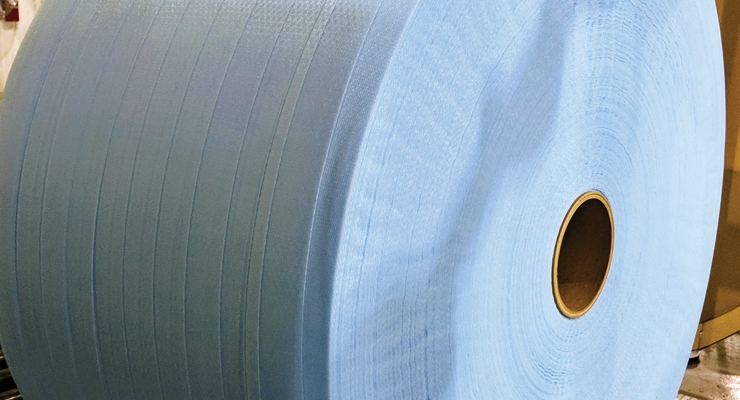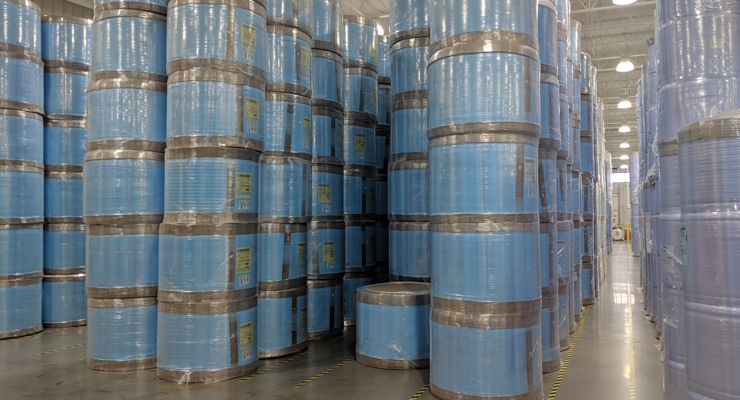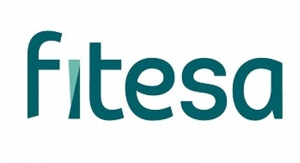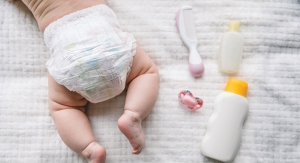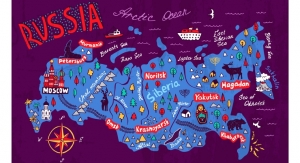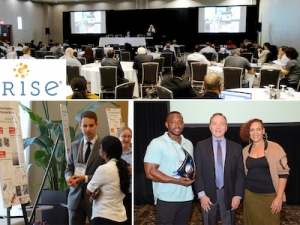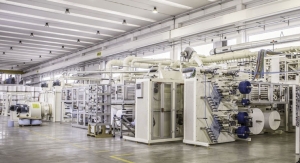Adrienne Green, Director of Sales, Personal and Home Care, Web Industries, Inc.11.02.18
When a global manufacturer of hygiene products tapped Tredegar Corporation as the supplier of a differentiated 3D apertured composite material for use in its personal care product, it mandated three critical criteria: the material would need to be delivered wound as large format spools, damage free and at a highly competitive price.
Tredegar is widely acknowledged for its film and laminate material design innovations and consistent quality. Headquartered in Richmond, VA, the business has production locations in North and South America, Europe and Asia. Its global distribution reach and innovation capabilities are unmatched among personal care material manufacturers and were the key reasons for the company’s selection as the supply source.
While Tredegar has extensive material manufacturing resources, it did not precisely have the large scale slitting and spooling capability necessary to meet its customer’s requirement. What Tredegar did have was an ongoing relationship with Web Industries, a company that had both the requisite capacity for the job and the mindset to join forces as a true partner in the venture.
Headquartered in Marlborough, MA, with six production facilities in the U.S. and a manufacturing and sales presence in Germany, Web Industries offers precision converting and outsource manufacturing services to the personal and home care, aerospace, medical and industrial markets.
The Challenge
Most Tredegar materials are supplied as pancake rolls, a winding format with limited capacity compared to spools, which have become the standard for winding diaper and feminine hygiene materials. The large capacity spools specified by the hygiene products customer would greatly reduce needs for splicing during manufacturing, with a corresponding increase in throughput. Tredegar estimates that its customer will reduce splicing from one roll every 15-20 minutes to one every 2-3 hours, decreasing the number of roll changes by at least 600%.
Tredegar’s differentiated 3D apertured composite material is used as an acquisition distribution layer (ADL) for diaper and similar personal care products. Its unique design allows for greater breathability and superior fluid management properties at lower basis weight than conventional nonwoven ADLs, enabling the construction of thinner, drier, flexible diapers. The lower basis weight and 3D structure make the material more challenging to spool than conventional nonwovens.
“Our 3D structures contain cone-shaped holes,” says Ahmed Makhani, Tredegar’s senior global product manager, Personal Care. “And maintaining the integrity of the cone is very critical.”
Spooling this material called for extraordinary care. If the material was slit and wound too tight, the system’s rewind would crush the cones, which would affect the material’s performance. At the same time, there needed to be sufficient tension to pull the material through the slitting and winding process. Light tension and sufficient pack force at the point where the material is rewound onto the spool without damage constituted the chief engineering challenge.
Meeting The Challenge
Web’s customer promise is “ingenuity with a personal touch,” a claim that would soon be put to the test due to the hygiene product manufacturer’s tight technical specs and turnaround demands.
Indeed, Web’s first order of business was to initiate testing and delivery of commercial product under deadline pressure.
“When a customer has a new product request, they usually ask for sample rolls, which can take from 4 to 8 weeks,” Makhani notes. “After that there are trials and a qualification process where we ask our customer to first try a few spools, and then try a half container and then move to a full container. For this application, we sent a few sample spools, but there was no activity for a couple of months. When we did hear back, our customer wanted commercial loads in just two to three weeks.”
“Normally we would have pushed back,” Makhani continues, “but considering the opportunity, extra effort was worthwhile. So, we sat down with Web and explained where we were and what needed to happen, and they took ownership, the same ownership we would expect to take ourselves. From the beginning of the project, Web behaved as a true partner.”
Web ran trials on its pilot line and succeeded in replicating everything on its commercial line. The transition from a pilot to a commercial line – going from one spool head on the pilot to 52 spool heads on the commercial line —called for Web to overcome a lot of variation.
“We ran trials at Web just to see how well the material would unwind before even sending it to the customer,” reports Tredegar’s director of research & development Todd Skochdopole. “So we had a good feeling that it would be correct the first time.”
Web’s ability to slit and then precisely spool damage-free rolls of the differentiated 3D composite material rests on its custom-designed spooling equipment and the company’s deep engineering competence. This also enabled Web to meet Tredegar’s customer’s demand for rapid turnaround in the retail market. “Web was able to meet the time line,” Makhani says.
Equipment Resources
According to Web Industries’ Tom Lucas, an engineer based at Web’s recently expanded Ft. Wayne, IN, facility, which is where the spooling takes place, the plant’s machinery was built with precision spooling in mind. “There’s no other asset like this in the world,” Lucas says. “We have the biggest scale for large format spooling of this type of material. Tension is controlled through drives and motors and we are an expert with these. We use surface winding technology which allows us to get low tension for big rolls. The packing force is ultimately controlled through air cylinders – a pneumatic force — that are controlled by a computer program. And that program allows us to change the pack pressures slightly as the roll builds in size. This is where the higher level engineering comes into play. We make minor modifications prior to each project and adjust total web tension, at times to less than one pound. The machine is built for these low tension, soft, sensitive materials.”
For the Tredegar project, Web upgraded the machine and its electronics for throughput and reliability. “Tredegar came to us with an incredible amount of volume,” Lucas says. “We are a company of huge scale, so we were able to take it on for distribution to multiple continents.”
Web Industries supplies Tredegar’s customer with differentiated 3D composite material wound on 48-inch O.D. spools containing 98,000 linear ft. per spool. Film slit widths can range from 70 to 105 mm. Part of Web Industries’ expertise is determining the type of wind that is best suited for the application. Choices can include parallel winds, a specific percentage of overlapping winds and others. The big question for the Tredegar project was, which type of wind would facilitate the least amount of tension? Ultimately, Web engineers selected a STEP-PAC wind, which is a form of traverse wind one might see in a fishing reel. In addition to helping facilitate lighter tension, the wind also reduces the number of splices needed during manufacturing operations.
End User Satisfaction
Makhani reports that Tredegar’s hygiene product customer is “absolutely satisfied” with the quality of the spools. “Our customer has a rigorous qualification process, as do most manufacturers of hygiene products. They wanted to ensure they were not jeopardizing their brand, so they did a lot of testing, and they have been pleased with the way the material has been delivered to them as well as with the response in the marketplace.”
Looking Ahead
Tredegar is now preparing to launch a next generation of ADL structures that will be even softer and improve performance. As a result of Web Industries’ and Tredegar’s joint work to date, Web will be a part of this next product launch.
At the same time, Web has just launched a second generation spooler, one that will provide even better control and greater capacity to accommodate the growing personal care business.
The new line is capable of producing 60,000 linear meter spools, depending on material thickness and spool dimensions. The spooler provides enhanced efficiencies, superior quality, and an exceptional cost-to-price ratio for the diaper and personal care market.
Tredegar is widely acknowledged for its film and laminate material design innovations and consistent quality. Headquartered in Richmond, VA, the business has production locations in North and South America, Europe and Asia. Its global distribution reach and innovation capabilities are unmatched among personal care material manufacturers and were the key reasons for the company’s selection as the supply source.
While Tredegar has extensive material manufacturing resources, it did not precisely have the large scale slitting and spooling capability necessary to meet its customer’s requirement. What Tredegar did have was an ongoing relationship with Web Industries, a company that had both the requisite capacity for the job and the mindset to join forces as a true partner in the venture.
Headquartered in Marlborough, MA, with six production facilities in the U.S. and a manufacturing and sales presence in Germany, Web Industries offers precision converting and outsource manufacturing services to the personal and home care, aerospace, medical and industrial markets.
The Challenge
Most Tredegar materials are supplied as pancake rolls, a winding format with limited capacity compared to spools, which have become the standard for winding diaper and feminine hygiene materials. The large capacity spools specified by the hygiene products customer would greatly reduce needs for splicing during manufacturing, with a corresponding increase in throughput. Tredegar estimates that its customer will reduce splicing from one roll every 15-20 minutes to one every 2-3 hours, decreasing the number of roll changes by at least 600%.
Tredegar’s differentiated 3D apertured composite material is used as an acquisition distribution layer (ADL) for diaper and similar personal care products. Its unique design allows for greater breathability and superior fluid management properties at lower basis weight than conventional nonwoven ADLs, enabling the construction of thinner, drier, flexible diapers. The lower basis weight and 3D structure make the material more challenging to spool than conventional nonwovens.
“Our 3D structures contain cone-shaped holes,” says Ahmed Makhani, Tredegar’s senior global product manager, Personal Care. “And maintaining the integrity of the cone is very critical.”
Spooling this material called for extraordinary care. If the material was slit and wound too tight, the system’s rewind would crush the cones, which would affect the material’s performance. At the same time, there needed to be sufficient tension to pull the material through the slitting and winding process. Light tension and sufficient pack force at the point where the material is rewound onto the spool without damage constituted the chief engineering challenge.
Meeting The Challenge
Web’s customer promise is “ingenuity with a personal touch,” a claim that would soon be put to the test due to the hygiene product manufacturer’s tight technical specs and turnaround demands.
Indeed, Web’s first order of business was to initiate testing and delivery of commercial product under deadline pressure.
“When a customer has a new product request, they usually ask for sample rolls, which can take from 4 to 8 weeks,” Makhani notes. “After that there are trials and a qualification process where we ask our customer to first try a few spools, and then try a half container and then move to a full container. For this application, we sent a few sample spools, but there was no activity for a couple of months. When we did hear back, our customer wanted commercial loads in just two to three weeks.”
“Normally we would have pushed back,” Makhani continues, “but considering the opportunity, extra effort was worthwhile. So, we sat down with Web and explained where we were and what needed to happen, and they took ownership, the same ownership we would expect to take ourselves. From the beginning of the project, Web behaved as a true partner.”
Web ran trials on its pilot line and succeeded in replicating everything on its commercial line. The transition from a pilot to a commercial line – going from one spool head on the pilot to 52 spool heads on the commercial line —called for Web to overcome a lot of variation.
“We ran trials at Web just to see how well the material would unwind before even sending it to the customer,” reports Tredegar’s director of research & development Todd Skochdopole. “So we had a good feeling that it would be correct the first time.”
Web’s ability to slit and then precisely spool damage-free rolls of the differentiated 3D composite material rests on its custom-designed spooling equipment and the company’s deep engineering competence. This also enabled Web to meet Tredegar’s customer’s demand for rapid turnaround in the retail market. “Web was able to meet the time line,” Makhani says.
Equipment Resources
According to Web Industries’ Tom Lucas, an engineer based at Web’s recently expanded Ft. Wayne, IN, facility, which is where the spooling takes place, the plant’s machinery was built with precision spooling in mind. “There’s no other asset like this in the world,” Lucas says. “We have the biggest scale for large format spooling of this type of material. Tension is controlled through drives and motors and we are an expert with these. We use surface winding technology which allows us to get low tension for big rolls. The packing force is ultimately controlled through air cylinders – a pneumatic force — that are controlled by a computer program. And that program allows us to change the pack pressures slightly as the roll builds in size. This is where the higher level engineering comes into play. We make minor modifications prior to each project and adjust total web tension, at times to less than one pound. The machine is built for these low tension, soft, sensitive materials.”
For the Tredegar project, Web upgraded the machine and its electronics for throughput and reliability. “Tredegar came to us with an incredible amount of volume,” Lucas says. “We are a company of huge scale, so we were able to take it on for distribution to multiple continents.”
Web Industries supplies Tredegar’s customer with differentiated 3D composite material wound on 48-inch O.D. spools containing 98,000 linear ft. per spool. Film slit widths can range from 70 to 105 mm. Part of Web Industries’ expertise is determining the type of wind that is best suited for the application. Choices can include parallel winds, a specific percentage of overlapping winds and others. The big question for the Tredegar project was, which type of wind would facilitate the least amount of tension? Ultimately, Web engineers selected a STEP-PAC wind, which is a form of traverse wind one might see in a fishing reel. In addition to helping facilitate lighter tension, the wind also reduces the number of splices needed during manufacturing operations.
End User Satisfaction
Makhani reports that Tredegar’s hygiene product customer is “absolutely satisfied” with the quality of the spools. “Our customer has a rigorous qualification process, as do most manufacturers of hygiene products. They wanted to ensure they were not jeopardizing their brand, so they did a lot of testing, and they have been pleased with the way the material has been delivered to them as well as with the response in the marketplace.”
Looking Ahead
Tredegar is now preparing to launch a next generation of ADL structures that will be even softer and improve performance. As a result of Web Industries’ and Tredegar’s joint work to date, Web will be a part of this next product launch.
At the same time, Web has just launched a second generation spooler, one that will provide even better control and greater capacity to accommodate the growing personal care business.
The new line is capable of producing 60,000 linear meter spools, depending on material thickness and spool dimensions. The spooler provides enhanced efficiencies, superior quality, and an exceptional cost-to-price ratio for the diaper and personal care market.

